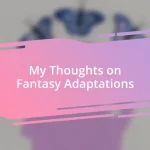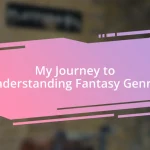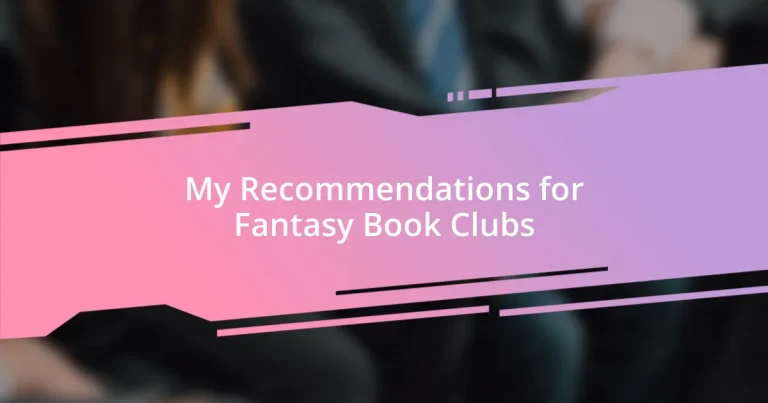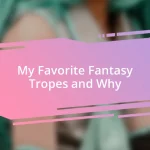Key takeaways:
- Highlighted must-read fantasy books include *The Name of the Wind*, *A Darker Shade of Magic*, and *The Priory of the Orange Tree*, each offering unique themes and immersive worlds.
- Essential fantasy themes such as the struggle between good and evil, quests for identity, and the significance of friendship enrich discussions and reflections in book clubs.
- To foster engaging discussions and sustained interest, explore diverse authors, incorporate themed challenges, and create an inclusive environment that values every member’s perspective.

Best Fantasy Books to Read
When I think about the best fantasy books to read, The Name of the Wind by Patrick Rothfuss often comes to mind. It isn’t just a story; it’s a masterclass in storytelling, blending lyrical prose with a deeply emotional narrative. I still remember the thrill of diving into Kvothe’s world, where every page felt like a discovery. Isn’t it fascinating how a book can make you feel so deeply connected to a character’s journey?
Another standout for me is A Darker Shade of Magic by V.E. Schwab. The concept of parallel Londons—each with its own degree of magic—really ignited my imagination. The characters, especially Kell, are so richly developed that I felt as if I was traveling alongside them. Don’t you love when a book transports you to a place so vividly that you can almost smell the air and hear the sounds?
Lastly, I can’t overlook The Priory of the Orange Tree by Samantha Shannon. This sprawling epic not only features dragons but also weaves in themes of feminism and diversity beautifully. I found myself cheering for the characters while also reflecting on broader societal issues. Isn’t it incredible how fantasy can serve as a mirror to our reality, allowing us to explore complex issues through the lens of extraordinary worlds?

Essential Themes in Fantasy
Exploring essential themes in fantasy literature is like peeling back layers of an onion; each layer reveals something deeper and more meaningful. One of the most profound themes I’ve encountered is the classic battle between good and evil. It’s not just simplistic black-and-white; rather, it prompts readers to contemplate the complexity of morality. I recall finishing The Lord of the Rings and feeling a sense of urgency to reflect on my own values and decisions. Have you ever closed a book and found yourself questioning what truly defines good and evil in your own life?
Another captivating theme is the quest for identity. Characters often embark on journeys—not just through fantastical realms but also within themselves. When I read The Bone Season by Samantha Shannon, the protagonist’s struggle to reconcile her unique abilities with societal expectations spoke to me on a personal level. I could relate to wanting to embrace individuality while also yearning for acceptance. Isn’t that a feeling we can all resonate with?
Lastly, I appreciate how fantasy often explores themes of friendship and loyalty. These elements can be beautifully portrayed through complex relationships that resonate with our own bonds. I remember reading Harry Potter and being reminded of my own friendships forged through shared experiences. The trials faced by characters and how they support one another can instill a sense of hope. Isn’t it comforting to see that amidst chaos, friendships can be a source of strength?
| Theme | Description |
|---|---|
| Good vs. Evil | A complex exploration of morality and the spectrum beyond binary thinking. |
| Quest for Identity | Characters navigate their unique abilities and societal expectations, prompting self-reflection. |
| Friendship and Loyalty | A portrayal of relationships that thrive amid challenges, offering comfort and strength to characters. |

Tips for Choosing Books
Choosing the right books for your fantasy book club can be a delightful challenge. I often recommend considering the interests and preferences of all members—after all, you want everyone to be engaged. I remember one book club where we picked a novel rife with political intrigue, and it sparked an intense debate that lasted well beyond our meeting. It was exciting to see everyone bring their perspectives to the table, making the discussion richer and more enjoyable.
Here are some tips to keep in mind:
- Diversity of Authors: Choose books by authors from varied backgrounds to expose the group to different cultures and perspectives within the fantasy genre.
- Vary Genres: Mix in sub-genres like urban fantasy or magical realism. This keeps the selections fresh and appeals to different tastes.
- Seek Recommendations: Encourage club members to suggest books—they may surprise you with hidden gems that resonate on a personal level.
- Check Length and Complexity: Balance long novels with shorter reads to maintain momentum and ensure everyone can keep up with the schedule.
- Incorporate Themes: Select books with strong themes or messages that will spark interesting discussions, like identity and morality, which can resonate deeply with everyone.
Making these choices thoughtfully can enhance the overall experience, ensuring lively discussions and lasting memories—all essential ingredients for a successful book club.

Engaging Discussion Questions
When it comes to fostering engaging discussions in a fantasy book club, asking the right questions can make all the difference. One question I love to pose is, “What character’s journey felt most relatable to you, and why?” Reflecting on personal connections to characters often brings out heartfelt stories about our own struggles or joys. For instance, I once shared how a character’s battle with self-acceptance mirrored my experiences in high school, which led to a lively discussion where everyone shared their own moments of vulnerability.
Another impactful question is, “How do the themes in this book resonate with real-world issues we face today?” This prompts members to connect fantastical elements to their own lives in meaningful ways. After reading A Wizard of Earthsea, I was surprised by how discussions about the balance of power and personal responsibility echoed current societal challenges. It’s fascinating to see how fiction can often serve as a mirror to our reality, isn’t it?
Lastly, consider asking, “Which magical element in this story would you want to experience in your life?” This question not only sparks imaginative dialogue but also invites everyone to share their dreams and wishes. I fondly remember my book club’s animated exchange about teleportation; it was a joyous moment that highlighted not just the allure of magic but our shared aspirations for adventure and escape. It’s these kinds of questions that transform a simple meeting into an enriching experience, don’t you think?

Creating a Welcoming Environment
Creating a welcoming environment is vital for any fantasy book club to thrive. I remember the first meeting of my book club, where the host set up a cozy space with twinkling fairy lights and comfy cushions. It immediately put everyone at ease and prompted not just small talk, but real conversations about our favorite fantasy worlds. A simple, inviting atmosphere can work wonders; it encourages all members to feel comfortable sharing their thoughts.
Inclusivity is key. I’ve found that when everyone’s ideas are considered, the discussions become significantly more vibrant. For instance, I once participated in a club where we had a “book of the month” spotlight, allowing every member to share what they loved about a particular story. This not only highlighted each person’s interests but also fostered a sense of belonging within the group. Have you ever noticed how much richer conversations become when everyone feels like they have a voice?
Setting ground rules can also help create that welcoming vibe. For example, we established a no judgment zone regarding opinions—everyone’s thoughts were respected, no matter how divergent they were. This truly transformed our gatherings into a safe haven for expressing our ideas. I recall one discussion about a book that was somewhat controversial; instead of tension, we found understanding and camaraderie, which ultimately deepened our connections. Isn’t it incredible how a little structure can magnify the enjoyment of sharing stories together?

Strategies for Sustained Interest
One effective strategy for maintaining interest in a fantasy book club is to periodically rotate leadership roles among members. I remember when my friend took the helm for our monthly meeting, and the fresh energy she brought reignited our discussions. Each member has unique perspectives, so giving everyone the chance to curate a meeting can lead to unexpected themes and insights. Have you experienced how a new leader can shift the entire atmosphere?
Incorporating themed reading challenges can also keep enthusiasm alive. For instance, we once ventured into a “Magic in Myth” month, where we explored different cultures’ mythologies reflected in fantasy literature. This not only broadened our reading horizons but sparked debates about cultural representation and significance. I was amazed by how much deeper our discussions became when we examined the roots of the stories we loved. Isn’t it thrilling how a little variety can transform our reading experience?
Finally, consider hosting special events or book-related activities, such as costume nights or even movie screenings of adaptations. I recall our club dressing as our favorite characters for a screening of The Lord of the Rings. It was more than just fun; it deepened our camaraderie and transformed our conversations into vibrant, enthusiastic exchanges about the adaptations. Wouldn’t you agree that these shared experiences create lasting bonds that enrich our love for the genre?

Resources for Fantasy Readers
For fantasy readers looking to enhance their experience, book recommendation websites can be a goldmine. I often find myself scrolling through platforms like Goodreads, where you can discover hidden gems and track what fellow readers are enjoying. Have you ever stumbled upon a book you loved, simply because someone wrote a passionate review? Those personal touches make all the difference and encourage you to explore outside your usual favorites.
Social media groups dedicated to fantasy genres are also fantastic resources. I remember joining a Facebook group where fans debated everything from character arcs to world-building techniques. The passion in those discussions was infectious, and I ended up discovering several series I wouldn’t have considered otherwise. It’s amazing how engaging with a community can open your eyes to a universe of stories.
Another enriching resource is podcasts that delve into fantasy literature. I’ve spent countless hours listening to discussions that break down beloved books or introduce new titles. Recently, I listened to an episode that dissected a series I felt lukewarm about. Their insights revitalized my interest, making me eager to give it another shot. Have you found that a good podcast can turn your perspective upside down? It certainly did for me!














